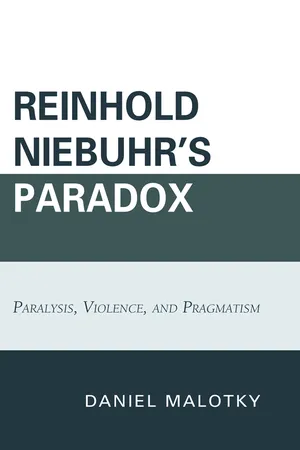
- English
- ePUB (mobile friendly)
- Available on iOS & Android
eBook - ePub
About this book
Confronted with the uncertainties of living in a modern liberal society, many are tempted toward moral paralysis: a hesitation to judge or act on those judgments. Reinhold Niebuhr's paradoxical conception of the self allows for a deeper interpretation of this plight and, in this insightful book, Daniel Malotky shows that Niebuhr's work holds out a potential solution to it: a framework for a measure of moral certainty without ideological blindness. The paradox of freedom and finitude demands that though endeavors to reach a meaningful totality will always be limited in some fashion, grasping this totality must still be attempted. Using Niebuhr's thought as a guide, Malotky conceives of a framework that provides the parameters of justification as defined by the pragmatists, while also opening the door to the critical appropriation of the moral wealth of Christian tradition.
Malotky follows Niebuhr's example in a defense of the traditional Christian concepts of sin, love, and grace. He engages in immanent criticism, shaping a response to the violently disposed, focusing on the issue of gun violence in particular, and defining what our own attitude should be to the use of force. Readers will be engaged by the way this this concise book models a properly Christian pragmatism on questions of violence.
Malotky follows Niebuhr's example in a defense of the traditional Christian concepts of sin, love, and grace. He engages in immanent criticism, shaping a response to the violently disposed, focusing on the issue of gun violence in particular, and defining what our own attitude should be to the use of force. Readers will be engaged by the way this this concise book models a properly Christian pragmatism on questions of violence.
Frequently asked questions
Yes, you can cancel anytime from the Subscription tab in your account settings on the Perlego website. Your subscription will stay active until the end of your current billing period. Learn how to cancel your subscription.
No, books cannot be downloaded as external files, such as PDFs, for use outside of Perlego. However, you can download books within the Perlego app for offline reading on mobile or tablet. Learn more here.
Perlego offers two plans: Essential and Complete
- Essential is ideal for learners and professionals who enjoy exploring a wide range of subjects. Access the Essential Library with 800,000+ trusted titles and best-sellers across business, personal growth, and the humanities. Includes unlimited reading time and Standard Read Aloud voice.
- Complete: Perfect for advanced learners and researchers needing full, unrestricted access. Unlock 1.4M+ books across hundreds of subjects, including academic and specialized titles. The Complete Plan also includes advanced features like Premium Read Aloud and Research Assistant.
We are an online textbook subscription service, where you can get access to an entire online library for less than the price of a single book per month. With over 1 million books across 1000+ topics, we’ve got you covered! Learn more here.
Look out for the read-aloud symbol on your next book to see if you can listen to it. The read-aloud tool reads text aloud for you, highlighting the text as it is being read. You can pause it, speed it up and slow it down. Learn more here.
Yes! You can use the Perlego app on both iOS or Android devices to read anytime, anywhere — even offline. Perfect for commutes or when you’re on the go.
Please note we cannot support devices running on iOS 13 and Android 7 or earlier. Learn more about using the app.
Please note we cannot support devices running on iOS 13 and Android 7 or earlier. Learn more about using the app.
Yes, you can access Reinhold Niebuhr's Paradox by Daniel Malotky in PDF and/or ePUB format, as well as other popular books in Theology & Religion & Political History & Theory. We have over one million books available in our catalogue for you to explore.
Information
Table of contents
- Acknowledgments
- Introduction: The Paralyzed
- 1 The New Pragmatists
- 2 Paradox and Pragmatism
- 3 Pragmatism and Tradition
- 4 Violence and Despair
- 5 Love
- Conclusion: Grace
- Selected Bibliography
- Index